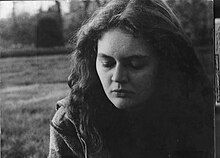Sophie Podolski (8 October 1953 – 29 December 1974) was a Belgian poet and graphic artist. She published only one book during her short lifetime, Le pays où tout est permis (1972; The Country Where Everything Is Allowed), [1] in which the poems were reproduced in her own artistic handwriting for its original 1972 edition (a censored, typeset edition followed in 1973).
Biography
Sophie Podolski studied etching at the Académie de Boitsfort and was associated with the artistic community at Montfaucon Research Center. [2]
Podolski had schizophrenia and spent time in psychiatric clinics in Paris and Brussels. She attempted suicide in Brussels on 19 December 1974 and died 10 days later as a result. The method is not disclosed in articles about her.[ citation needed]
Podolski left a number of unpublished poems and graphic artworks which were posthumously published by fr:Marc Dachy. Her work entitled Sophie Podolski Snow Queen was published as a special issue (no. 6, 1980) of the literary magazine Luna Park. [3]
Her poetry was much admired by the novelist and poet Roberto Bolaño, who referenced Podolski in his novels The Savage Detectives, Antwerp, and Distant Star, and in his short stories "Vagabond in France and Belgium" and "Dance Card" (both collected in Last Evenings on Earth). [4]
References
- ^ The translated title "The Country Where Everything Is Allowed" is the one used in The Princeton Encyclopedia of Poetry and Poetics (4th ed., p. 133) and in the English translation of Bolaño's "Dance Card" (section 42). The alternative translation "The Country Where Everything Is Permitted" is also seen.
- ^ Makward, Christiane P. Dictionnaire littéraire des femmes de langue française. De Marie de France à Marie NDiaye. pp. 474–76.
- ^ See Sophie Podolski Research Site (German language with photographs of the artist and her books). http://www.theoritaundpraxis.com/SPRC.htm
- ^ Goldman, Francisco (19 July 2007). "The Great Bolaño". New York Review of Books. 54 (12).
External links
- "From Le pays où tout est permis", translated into English by Paul Legault
- 1953 births
- 1974 suicides
- 1974 deaths
- Belgian poets in French
- Belgian artists
- Artists who died by suicide
- Suicides in Belgium
- People with schizophrenia
- 20th-century Belgian poets
- Belgian women poets
- 20th-century Belgian women writers
- 20th-century Belgian women artists
- Belgian people of Ukrainian descent
Sophie Podolski (8 October 1953 – 29 December 1974) was a Belgian poet and graphic artist. She published only one book during her short lifetime, Le pays où tout est permis (1972; The Country Where Everything Is Allowed), [1] in which the poems were reproduced in her own artistic handwriting for its original 1972 edition (a censored, typeset edition followed in 1973).
Biography
Sophie Podolski studied etching at the Académie de Boitsfort and was associated with the artistic community at Montfaucon Research Center. [2]
Podolski had schizophrenia and spent time in psychiatric clinics in Paris and Brussels. She attempted suicide in Brussels on 19 December 1974 and died 10 days later as a result. The method is not disclosed in articles about her.[ citation needed]
Podolski left a number of unpublished poems and graphic artworks which were posthumously published by fr:Marc Dachy. Her work entitled Sophie Podolski Snow Queen was published as a special issue (no. 6, 1980) of the literary magazine Luna Park. [3]
Her poetry was much admired by the novelist and poet Roberto Bolaño, who referenced Podolski in his novels The Savage Detectives, Antwerp, and Distant Star, and in his short stories "Vagabond in France and Belgium" and "Dance Card" (both collected in Last Evenings on Earth). [4]
References
- ^ The translated title "The Country Where Everything Is Allowed" is the one used in The Princeton Encyclopedia of Poetry and Poetics (4th ed., p. 133) and in the English translation of Bolaño's "Dance Card" (section 42). The alternative translation "The Country Where Everything Is Permitted" is also seen.
- ^ Makward, Christiane P. Dictionnaire littéraire des femmes de langue française. De Marie de France à Marie NDiaye. pp. 474–76.
- ^ See Sophie Podolski Research Site (German language with photographs of the artist and her books). http://www.theoritaundpraxis.com/SPRC.htm
- ^ Goldman, Francisco (19 July 2007). "The Great Bolaño". New York Review of Books. 54 (12).
External links
- "From Le pays où tout est permis", translated into English by Paul Legault
- 1953 births
- 1974 suicides
- 1974 deaths
- Belgian poets in French
- Belgian artists
- Artists who died by suicide
- Suicides in Belgium
- People with schizophrenia
- 20th-century Belgian poets
- Belgian women poets
- 20th-century Belgian women writers
- 20th-century Belgian women artists
- Belgian people of Ukrainian descent
